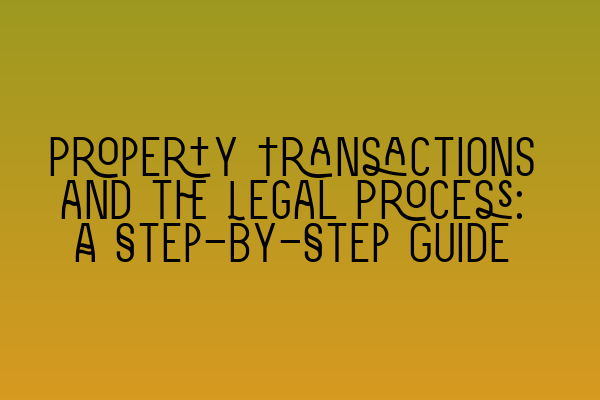Property Transactions and the Legal Process: A Step-by-Step Guide
Are you considering buying or selling a property? Understanding the legal process involved in property transactions is crucial to ensure a smooth transaction and protect your interests. In this comprehensive guide, we will take you through the step-by-step process of property transactions, from the initial stages to completion. So, let’s dive in!
1. Getting Started: Preliminary Steps
The first step in any property transaction is to engage the services of a solicitor who specializes in property law. Your solicitor will be your trusted advisor throughout the process, handling all legal aspects on your behalf. They will conduct initial searches to ensure that there are no hidden legal issues with the property and determine if there are any planning or development restrictions that may affect your purchase.
During this stage, it is also important to secure your finances. If you require a mortgage, you should consult with a lender and obtain a mortgage offer in principle to determine your budget and affordability.
2. Making an Offer and Negotiating Terms
Once you have found a property you wish to purchase, you will need to make an offer to the seller. Your solicitor will be instrumental in guiding you through this process, providing advice on the appropriate offer price and negotiating terms on your behalf.
It is essential to have a clear understanding of the terms and conditions of the sale, including any additional clauses or warranties that need to be included in the contract. Your solicitor will review the draft contract and advise you on any issues or concerns that may arise.
3. Conducting Searches and Surveys
Once your offer has been accepted, your solicitor will commence the necessary searches and surveys to ensure that the property is legally sound and meets your requirements. These searches may include local authority searches, environmental searches, and drainage searches, among others. The purpose of these searches is to identify any potential issues that may affect the property’s value or your ability to live there.
In addition to searches, it is advisable to conduct a thorough survey of the property to highlight any structural issues or defects that may require attention. This will help you make an informed decision about the purchase and negotiate any necessary repairs or price adjustments.
4. Exchanging Contracts
The exchange of contracts is a critical stage in the property transaction process. At this point, both the buyer and seller are legally bound to complete the transaction. Before the exchange, your solicitor will ensure that all necessary documents are in order, including the mortgage offer (if applicable), title deeds, and any necessary permissions or consents.
During the exchange, the deposit, usually 10% of the purchase price, is paid to the seller’s solicitor. Once the contracts are exchanged, a completion date is set. It is important to note that withdrawing from the transaction after exchange can result in severe financial penalties.
5. Completion Day
Completion day is the culmination of the property transaction process. On this day, your solicitor will transfer the remaining funds to the seller’s solicitor, and ownership of the property will pass to you. Your solicitor will register the property in your name with the appropriate land registry and handle the payment of any outstanding legal fees and taxes.
It is customary for the keys to the property to be handed over on completion day, allowing you to finally move into your new home or hand over the property to the buyer if you are the seller.
Conclusion
Navigating the legal process of property transactions can be complex and overwhelming. Engaging the services of a reputable solicitor specializing in property law is essential to ensure a successful and stress-free transaction. By following the step-by-step guide outlined above, you will have a comprehensive understanding of the key stages involved in property transactions.
If you have any questions or require further guidance on property law or other legal matters, please do not hesitate to contact SQE Property Law & Land Law. Our team of experienced solicitors is ready to assist you.
Related Articles:
– Interactive SQE Mock Tests for Contract Law: Test Your Knowledge
– Join Our SQE Contract Law Webinars: Expert Insights and Guidance
– Contract Law Reforms: An Analysis of Recent Changes
– Parties in a Contract: Rights and Responsibilities
– The Importance of Ethics in Contract Law: A Comprehensive Guide
